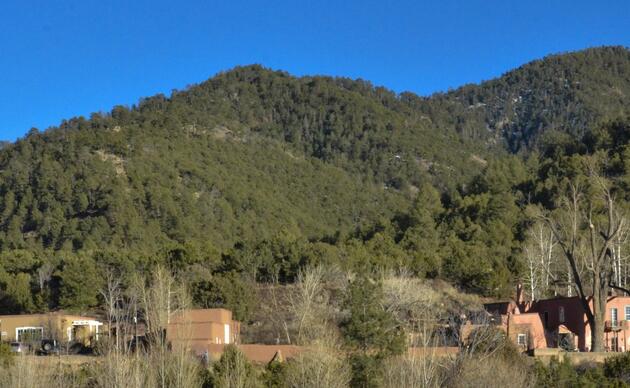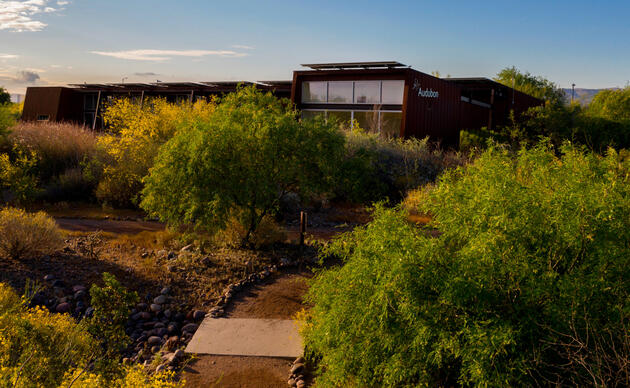Conservation Heroes
Anne Beckett lives in Eldorado, New Mexico and is a consultant to nonprofit and for profit businesses in the areas of new initiative development, strategic planning, and operations. She has over 35 years of business experience in administration and operations. This last year, Anne traveled to D.C. to talk with New Mexico elected representatives to ask them to pass legislation to reduce greenhouse emissions that contribute to climate change.
What brought you to New Mexico?
In 1995 I headed to the Zuni Pueblo for my graduate school internship requirement. I was only supposed to stay for 12 weeks, but ended up staying for four years. By then I was hooked on New Mexico, which has a similar feeling to California of the 1950s and 60s where I grew up.
Earlier this year you went to an Audubon Activist Training on Climate Change in D.C. what were the highlights of that trip?
I really appreciated the opportunity to meet and learn from the National Audubon D.C. policy and science staff. In addition to providing us with current information about the impacts of climate change, we received instruction in lobbying, which was very informative and proved very useful in my visits to the offices of Senators Udall and Bingaman and Congressman Lujan. I felt prepared to speak both with the legislators and their staff about the issues and to focus on what was meaningful to them.
With all of the critical issues facing the world today, what motivated you to volunteer your time to speak out about climate change on behalf of Audubon?
Late last year I had the privilege of visiting Antarctica, in part because I wanted to see for myself the impacts of climate disruption. For example, loss of glacier ice is causing more and more of the Adelie penguins to abandon their breeding grounds. And, with an increase in ocean water temperatures, the range of Krill—a vast source of food in the oceanic food web—is moving farther away from Antarctica leaving many animals dependant on Krill malnourished. It’s impossible not to fall in love with Antarctica and when I got home I wanted to be sure that I did everything I could to help protect that incredibly special place. Audubon’s grassroots approach to addressing the issues of clean energy seemed a good fit.
What was the most informative or useful tip you learned about lobbying that you would like to share with New Mexico Auduboners that have never lobbied before?
The fact that our legislators cannot know everything. They are thrilled when they receive good quality information from a source in which they have confidence. Audubon is a respected source of environmental and conservation information and as a person associated with Audubon, your opinion is appreciated.
Now that you have lobbied was it harder or easier than you thought?
Senator Tom Udall and Congressman Ben Ray Lujan are easy to talk to because they are already on board. With them I feel like I am offering consistent encouragement, so they stay the course.
What was your worst fear about lobbying and did it come true?
I was worried that I only know so much about the science of climate change and I was afraid I would come off as ill-informed. Thanks to my Audubon training, I knew enough to get to heart of the issues, could ask intelligent questions, and had information to share.
What progress on climate change legislation have you seen so far?
I was exceedingly disappointed when the Senate did not match the efforts of the House. The Kerry Lieberman bill wasn’t even allowed to get to a full discussion by the Senate. Regardless of what you believe to be the cause of climate disruption, the United States cannot afford its continued dependence on oil. We fund nations who are not friendly to the United States with our purchase of oil and, as a result, threaten our own national security. Oil is a finite resource that pollutes. The Earth can only take so much pollution. It is up to us to preserve our home for future generations and with all its sun and wind, not to mention geothermal potential, New Mexico should be in the forefront of clean energy. Think of the jobs that could be created!
Many of our members don’t necessarily view themselves as “activists”. What would you say to someone who is wondering whether to speak up and get involved?
I like the term Advocate better. If you express your feelings on an issue to another person, you’re advocating. When you vote, you advocate. When you choose to purchase compact fluorescent light bulbs, you’re advocating. Every day each choice that we make reflects our beliefs and our advocacy. It all comes down to walking the talk to the best of our individual ability. Good change happens when lots of people do what they can for a good purpose.
How you can help, right now
Join the Western Water Action Network
Receive action alerts about water issues, and issues that are affecting birds across the arid West.
Donate
Help secure the future for birds at risk from climate change, habitat loss, and other threats. Your support will power our science, education, advocacy and on-the-ground conservation efforts.
Nina Mason Pulliam Rio Salado Audubon Center
Visit the Nina Mason Pulliam Rio Salado Audubon Center in Phoenix, Arizona.



